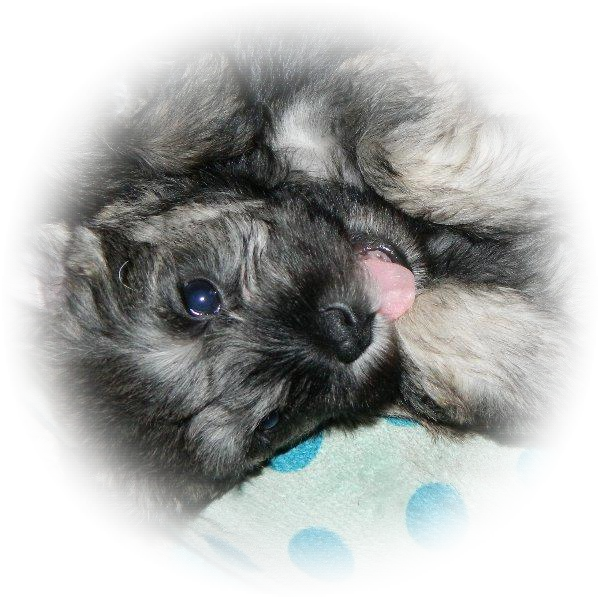
1 to 4 Years
The Maturity Period
During this period you may encounter some increased aggression and renewed testing for dominance, the position of pack leader. Continued training exercises with your dog during this period will not only be fun your dog, but will help reaffirm you as the true pack leader.
The Maturity Period
During this period you may encounter some increased aggression and renewed testing for dominance, the position of pack leader. Continued training exercises with your dog during this period will not only be fun your dog, but will help reaffirm you as the true pack leader.
Critical Periods in your Puppy's Life
Birth to 7 Weeks
The Neonatal, Transition, Awareness, and Canine Socialization Period
Your puppy is with their mother and littermates. During this period, puppies learn about social interaction, plan, and inhibiting aggression from their mother and littermates. Puppies must stay with their mother and littermates during this critical period as they learn to accept discipline, the most important lesson in their lives.
The Neonatal, Transition, Awareness, and Canine Socialization Period
Your puppy is with their mother and littermates. During this period, puppies learn about social interaction, plan, and inhibiting aggression from their mother and littermates. Puppies must stay with their mother and littermates during this critical period as they learn to accept discipline, the most important lesson in their lives.

Your puppy now has the brain waves of an adult dog, but their attention span is short. This period is when your puppy’s most rapid learning occurs. Learning at this age is permanent so this is a perfect time to start training. Also this is the ideal time to introduce your puppy to things that will play an important part in their life. Introduce them to different people, places, animals, objects and sounds, remembering do so in a positive, non-threatening way.
Avoid frightening your puppy during this period. Any traumatic, frightening or painful experience will have a more lasting effect on your puppy than if it occurred at any other time in their life.
Avoid frightening your puppy during this period. Any traumatic, frightening or painful experience will have a more lasting effect on your puppy than if it occurred at any other time in their life.
7 to 12 Weeks
The Human Socialization & Fear Imprint Period
The Human Socialization & Fear Imprint Period

12 to 16 Weeks
The Seniority Classification or the Age of Cutting Period
The Seniority Classification or the Age of Cutting Period
In this period your puppy will cut their teeth and their apron strings. Your puppy will begin testing who is going to be pack leader. You must discourage any biting in this period because such biting can be a sign of dominance. It is important that you are a strong and consistent leader. If formal training the likes of Puppy Classes is planned, this is the time to begin. Such training will help establish you as the pack leaded.
4 to 8 Months
The Play & Flight Instinct Period
This is the period when your puppy may wander and ignore you. It is very important that you keep your puppy on a leash at this time. The way you handle your puppy at this time will determine if your puppy will come to you when called.
At about 4-1/2 months, your puppy loses their milk teeth and gets their adult teeth. This is when your puppy will begin serious chewing. A dog's teeth do not set in their jaw until between 6 and 10 months. During this time, your puppy has a physical need to exercise their mouth by chewing, so get those chew toys out for them.
The Play & Flight Instinct Period
This is the period when your puppy may wander and ignore you. It is very important that you keep your puppy on a leash at this time. The way you handle your puppy at this time will determine if your puppy will come to you when called.
At about 4-1/2 months, your puppy loses their milk teeth and gets their adult teeth. This is when your puppy will begin serious chewing. A dog's teeth do not set in their jaw until between 6 and 10 months. During this time, your puppy has a physical need to exercise their mouth by chewing, so get those chew toys out for them.
6 to 14 Months
The Second Fear Imprint or Fear of New Situations Period
Your puppy, well young dog by now, again will show fear of new situations and even familiar situations. They may be reluctant to approach someone or something new. It is important that you are patient and act very matter of fact in these situations. Never force them to face the situation. Do not pet your puppy if frightened, or talk in soothing tones, as your puppy will interpret such responses as praise for being frightened. Continued training during this period will help improve your dog's confidence.
The Second Fear Imprint or Fear of New Situations Period
Your puppy, well young dog by now, again will show fear of new situations and even familiar situations. They may be reluctant to approach someone or something new. It is important that you are patient and act very matter of fact in these situations. Never force them to face the situation. Do not pet your puppy if frightened, or talk in soothing tones, as your puppy will interpret such responses as praise for being frightened. Continued training during this period will help improve your dog's confidence.